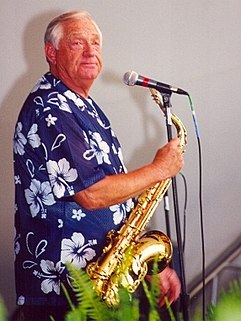
Elvis is the second studio album by American rock and roll singer Elvis Presley, released by RCA Victor in October 1956 in mono. Recording sessions took place on September 1, September 2, and September 3 at Radio Recorders in Hollywood, with one track left over from the sessions for Presley's debut album at the RCA Victor recording studios on January 30 in New York. It spent four weeks at #1 on the Billboard Top Pop Albums chart that year, making Presley the first recording artist to have both albums go straight to number one in the same year. It was certified Gold on February 17, 1960, and Platinum on August 10, 2011, by the Recording Industry Association of America.

His Hand in Mine is the fifth studio album by American singer and musician Elvis Presley, released on RCA Victor Records in mono and stereo, LPM/LSP 2328, in November 1960. It was the first of three gospel music albums that Presley would issue during his lifetime. Recording sessions took place on October 30 and 31, 1960, at RCA Studio B in Nashville, Tennessee. It peaked at #13 on the Top Pop Albums chart. It was certified Gold on April 9, 1969 and Platinum on March 27, 1992 by the Recording Industry Association of America.

How Great Thou Art is the ninth studio album by American singer and musician Elvis Presley, released by RCA Victor in mono and stereo in February 1967. Recording sessions took place at RCA Studio B in Nashville, Tennessee, on May 25, 26, 27, and 28, 1966. It peaked at No. 18 on the Top Pop Albums chart. It was certified Gold on February 16, 1968, Platinum and 2x Platinum on March 27, 1992 and 3x Platinum on October 13, 2010 by the RIAA. The title song won the 1967 Grammy Award for Best Sacred Performance.

Elvis' Gold Records Volume 4 is a greatest hits album by American rock and roll singer Elvis Presley, issued by RCA Victor in mono and stereo, LPM/LSP 3921, in January 1968, with recording sessions taking place over an eight-year span at RCA Studio B in Nashville, Tennessee, and at RCA Studios and Radio Recorders in Hollywood. It is a compilation of hit singles released between 1961 and 1967, peaking at number 33 on the Billboard 200. It was certified Gold on March 27, 1992 by the Recording Industry Association of America.
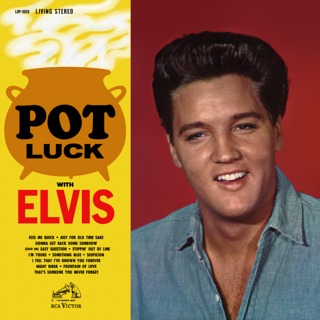
Pot Luck with Elvis is the seventh studio album by American singer and musician Elvis Presley, released on RCA Victor in mono and stereo, LPM/LSP 2523, in June 1962. Recording sessions took place on March 22, 1961, at Radio Recorders in Hollywood, and on June 25 and October 15, 1961, and March 18 and March 19, 1962, at RCA Studio B in Nashville, Tennessee. It peaked at number 4 on the Billboard Top LP's chart.

Singer Presents Elvis Singing Flaming Star and Others is a compilation album by American singer and musician Elvis Presley, released by RCA Records in October, 1968. It spent five months available only at select retail stores featuring products by the Singer Sewing Machine Company as a promotional tie-in with Presley's upcoming Christmas television special on the NBC network, which Singer had sponsored. It was reissued for normal retail channels as Elvis Sings Flaming Star in March 1969, becoming the first Elvis Presley budget album on the RCA Camden label, catalogue CAS 2304. The 1969 release peaked at number 96 on the Billboard 200 album chart. It was certified Gold on July 15, 1999, and Platinum on January 6, 2004, by the Recording Industry Association of America.

Let's Be Friends is a compilation album by American singer and musician Elvis Presley, released by RCA Records CAS 2408, in April 1970. It is the second Presley budget album to appear on the low-priced RCA Camden label. It peaked at number 105 on the Billboard 200 album chart. It was certified Gold on June 15, 1999 and Platinum on January 6, 2004 by the Recording Industry Association of America.

Loving You is the first soundtrack album by American rock and roll singer Elvis Presley. It was released by RCA Victor Records in mono, LPM 1515, in July 1957 to accompany his first starring film, Loving You (1957). Recording sessions took place on January 15, 16, 17, and 18, 1957, at the Paramount Pictures Scoring Stage, and on January 12, 13, 19, and February 23 and 24, 1957, at Radio Recorders in Hollywood. These are the first sessions where Steve Sholes is officially listed as producer. It spent ten weeks at No. 1 on the Billboard Top Pop Albums chart. It was certified Gold on April 9, 1968 by the Recording Industry Association of America.
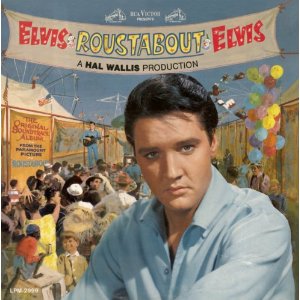
Roustabout is the ninth soundtrack album by American singer and musician Elvis Presley, released on RCA Victor Records in mono and stereo, LPM/LSP 2999, in October 1964. It is the soundtrack to the 1964 film of the same name starring Presley. Recording sessions took place at Radio Recorders in Hollywood, California, on March 2 and 3, and April 29, 1964. It peaked at number one on the Billboard Top LP's chart. It was certified Gold on May 20, 1988 by the Recording Industry Association of America. The album would be Presley's final soundtrack to reach number one and his last number one album until 1973's Aloha From Hawaii: Via Satellite.

"You'll Be Gone" is a song co-written by Elvis Presley and published by Elvis Presley Music and released in 1965 on the Girl Happy soundtrack album and as a 45 single. The song was recorded in 1962 and is significant because it was co-written by Elvis Presley, with his bodyguard Red West and Charlie Hodge. The other song that Elvis Presley composed was "That's Someone You Never Forget" in 1961 with Red West, which was on the Pot Luck LP released in 1962.
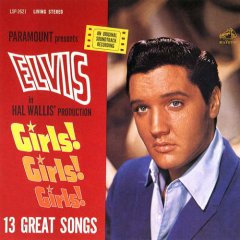
Girls! Girls! Girls! is the fifth soundtrack album by American singer and musician Elvis Presley, released on RCA Victor Records in mono and stereo, LPM/LSP 2426, in November 1962. It accompanied the 1962 film of the same name starring Presley. Recording sessions took place at Radio Recorders in Hollywood on March 26, 27, and 28, 1962. It peaked at number three on the Top LP's chart. It was certified Gold on August 13, 1963 by the Recording Industry Association of America.

Kissin' Cousins is the eighth soundtrack album by American singer and musician Elvis Presley, released by RCA Victor in mono and stereo, LPM/LSP 2894, in April 1964. It is the soundtrack to the 1964 film of the same name starring Presley. Recording sessions took place at RCA Studio B in Nashville, Tennessee, on May 26 and 27, and September 29 and 30, 1963. It peaked at number six on the Billboard Top LP's chart. The album was certified Gold on March 27, 1992 by the Recording Industry Association of America.

Harum Scarum is the eleventh soundtrack album by American singer and musician Elvis Presley, released by RCA Victor in mono and stereo, LPM/LSP 3468, in November 1965. It is the soundtrack to the 1965 film of the same name starring Presley. Recording sessions took place at RCA Studio B in Nashville, Tennessee, on February 24, 25, and 26, 1965. It peaked at number eight on the Top LP's chart.

Frankie and Johnny is the twelfth soundtrack album by American singer and musician Elvis Presley, released on RCA Victor Records in mono and stereo, LPM/LSP 3553, on March 1, 1966. It is the soundtrack to the 1966 film of the same name starring Presley. Recording sessions took place at Radio Recorders in Hollywood, California, on May 12, 13, and 14, 1965. It peaked at number 20 on the Top LP's chart. It was certified Gold and Platinum on January 6, 2004 by the Recording Industry Association of America.

Paradise, Hawaiian Style is the thirteenth soundtrack album by American singer and musician Elvis Presley, released by RCA Victor in mono and stereo, LPM/LSP 3643, in June 1966. It is the soundtrack to the 1966 film of the same name starring Presley. Recording sessions took place at Radio Recorders in Hollywood, California, on July 26 and 27, and August 2, 1965. It peaked at number 15 on the Top LP's chart.

Spinout is the fourteenth soundtrack album by American singer and musician Elvis Presley, released by RCA Victor in mono and stereo, LPM/LSP 3702, on October 31, 1966. It is the soundtrack to the 1966 film of the same name starring Presley. Recording sessions took place at Radio Recorders in Hollywood, California, on February 16 and 17, 1966. It peaked at number 18 on the Top Pop Albums chart.
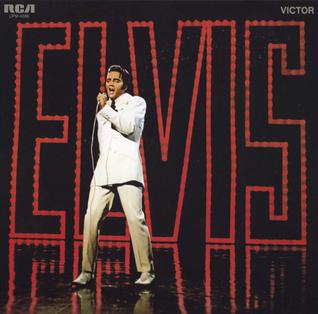
Elvis is a live album by American rock and roll singer Elvis Presley, released by RCA Records in December 1968. It was recorded from his 1968 Elvis special in Burbank, California at Western Recorders on June 20, 21, 22 and 23, 1968, and at NBC Studios (Burbank) on June 27 and 29, 1968. It peaked at #8 on the Billboard 200. It was certified Gold on July 22, 1969 and Platinum on July 15, 1999 by the RIAA.
" The Meanest Girl in Town", also known as "Yeah, She's Evil!" is a rock and roll song written by J. Byers, which was recorded in June 1964 by both Elvis Presley, as "The Meanest Girl in Town" for the soundtrack to the 1965 film release Girl Happy, and by Bill Haley & His Comets as "Yeah, She's Evil!" for a Decca Records single release.










